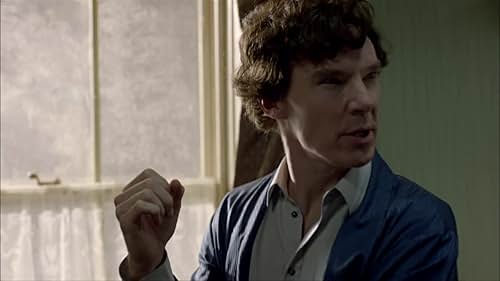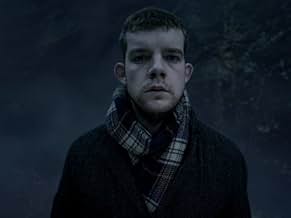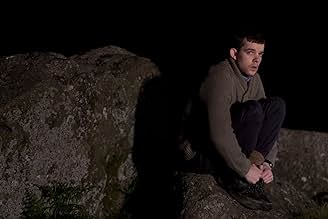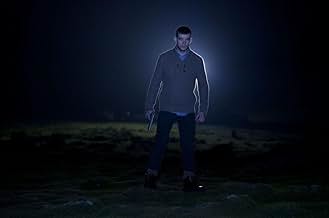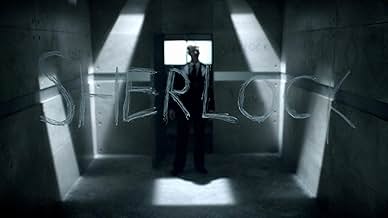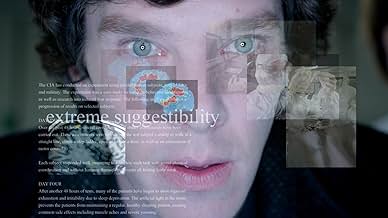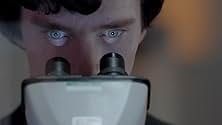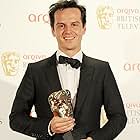Sherlock and John investigate the ghosts of a young man who has been seeing monstrous hounds out in the woods where his father died.Sherlock and John investigate the ghosts of a young man who has been seeing monstrous hounds out in the woods where his father died.Sherlock and John investigate the ghosts of a young man who has been seeing monstrous hounds out in the woods where his father died.
- Director
- Writers
- Stars
- Director
- Writers
- All cast & crew
- Production, box office & more at IMDbPro
Featured reviews
The Hound of Baskerville
When Mark Gatiss went on to remake The Hound of Baskerville for BBC's Sherlock- he knew what he was getting into. This one wasn't a short story- it was a full fledged novel, it has seen 23 film adaptations till date (the largest number for any of Holmes' adaptations) and is unique, perhaps the most iconic of Holmes career, because this is the only one that has Gothic horror elements. The blockbuster nature of the subject and the need of the Sherlock series to re-imagine the classic in a modern scenario presented complex challenges, and am pleased to say, the results are awesome.
Modernizing the story begins with modernizing the setting- So instead of a foreboding dark house alluding to the horror theme in the book, we have a modern day horror setting- army research facilities, you know where all germs, epidemics are bred, and chemical/biological weapons of war are created? You never know just what might they come up with one fine day, to spoil the rest of your lifetime. Anyways, Sherlock is in one of his most bored moods, he just isn't happy with the quality of cases at his disposal, which makes him edgy and maniacal. Up comes a young man plagued with nightmares about the death of his father at the fangs of a monstrous dog.
"It is as big as a horse, has red eyes, and glows"- Holmes is both intrigued and excited as he begins his pursuit on a dark, and desolate moor and then its a race against time as our heroes try to figure out the mystery before it takes more innocent lives. From the lighthearted erotic romp that was Scandal Belgravia, this one is straightaway a suspenseful, creepy, and rabid chase. There are moments of sheer atmospheric terror when Holmes decides to lock up Watson in a lab to conduct his own private experiment, and in the climax where he faces his fears- in the form of his mortal enemy, and yet there is the trademark humor and sardonic wit all throughout.
Benedict Cumberbatch is prodigal as usual. "I do not have friends", he says, as he treats us to both sides of Sherlock- his brilliance in observing the smallest possible detail, and deducing the most accurate fact, and his nasty, inhuman side- his superiority complex, and almost complete lack of feeling. There is plenty of warmth in Sherlock for Watson as there is sarcasm, but as Holmes can compartmentalize his mind, we too learn that his tongue and his heart also reside in separate compartments. And like in Belgravia, Sherlock gives a hint of his interest for the lovely Adler, here its his understanding of fear that brings out the best in him- he is a showstopper in the scene where he knows he has seen the impossible, but yet cannot believe his eyes, and almost breaks down because of the confusion he is in because his senses betray his mind. Martin Freeman as Watson gets to step out of Cumberbatch's shadows and do a bit of investigating on his own, and displays immense depth of character in addition to display of camaraderie.
We have come to expect ingenuity and wit, novelty and shock value from each episode of Sherlock, yet the intensity, apprehension and audience involvement in Hound of the Baskerville raises the bar even further. The episode ends with Moriarty getting released from the prison to set up a series finale at Reichenbach Fall, for the solution to the "final problem"- can't wait for 15th January!!! Oh, easy 10/10! Don't miss or it will hound you forever!!!
When Mark Gatiss went on to remake The Hound of Baskerville for BBC's Sherlock- he knew what he was getting into. This one wasn't a short story- it was a full fledged novel, it has seen 23 film adaptations till date (the largest number for any of Holmes' adaptations) and is unique, perhaps the most iconic of Holmes career, because this is the only one that has Gothic horror elements. The blockbuster nature of the subject and the need of the Sherlock series to re-imagine the classic in a modern scenario presented complex challenges, and am pleased to say, the results are awesome.
Modernizing the story begins with modernizing the setting- So instead of a foreboding dark house alluding to the horror theme in the book, we have a modern day horror setting- army research facilities, you know where all germs, epidemics are bred, and chemical/biological weapons of war are created? You never know just what might they come up with one fine day, to spoil the rest of your lifetime. Anyways, Sherlock is in one of his most bored moods, he just isn't happy with the quality of cases at his disposal, which makes him edgy and maniacal. Up comes a young man plagued with nightmares about the death of his father at the fangs of a monstrous dog.
"It is as big as a horse, has red eyes, and glows"- Holmes is both intrigued and excited as he begins his pursuit on a dark, and desolate moor and then its a race against time as our heroes try to figure out the mystery before it takes more innocent lives. From the lighthearted erotic romp that was Scandal Belgravia, this one is straightaway a suspenseful, creepy, and rabid chase. There are moments of sheer atmospheric terror when Holmes decides to lock up Watson in a lab to conduct his own private experiment, and in the climax where he faces his fears- in the form of his mortal enemy, and yet there is the trademark humor and sardonic wit all throughout.
Benedict Cumberbatch is prodigal as usual. "I do not have friends", he says, as he treats us to both sides of Sherlock- his brilliance in observing the smallest possible detail, and deducing the most accurate fact, and his nasty, inhuman side- his superiority complex, and almost complete lack of feeling. There is plenty of warmth in Sherlock for Watson as there is sarcasm, but as Holmes can compartmentalize his mind, we too learn that his tongue and his heart also reside in separate compartments. And like in Belgravia, Sherlock gives a hint of his interest for the lovely Adler, here its his understanding of fear that brings out the best in him- he is a showstopper in the scene where he knows he has seen the impossible, but yet cannot believe his eyes, and almost breaks down because of the confusion he is in because his senses betray his mind. Martin Freeman as Watson gets to step out of Cumberbatch's shadows and do a bit of investigating on his own, and displays immense depth of character in addition to display of camaraderie.
We have come to expect ingenuity and wit, novelty and shock value from each episode of Sherlock, yet the intensity, apprehension and audience involvement in Hound of the Baskerville raises the bar even further. The episode ends with Moriarty getting released from the prison to set up a series finale at Reichenbach Fall, for the solution to the "final problem"- can't wait for 15th January!!! Oh, easy 10/10! Don't miss or it will hound you forever!!!
Sherlock Holmes and Dr Watson head down to Dartmoor to investigate the case of a young man who is convinced that his father was killed 20 years earlier by a giant, red-eyed hound. Furthermore, he has recently been confronted by the animal himself. Holmes is skeptical - the description given is not possible - but investigates anyway. Prime suspect - the local Army base, where scientists are performing genetic experiments on animals.
Quite dark and very intriguing. Tension-filled with a sinister undertone, there's hardly a dull moment in this episode.
Holmes shows some vulnerability for once - about the only other time we've seen it was in A Scandal in Balgravia and there it was for different reasons...
Quite enthralling from start to finish.
Quite dark and very intriguing. Tension-filled with a sinister undertone, there's hardly a dull moment in this episode.
Holmes shows some vulnerability for once - about the only other time we've seen it was in A Scandal in Balgravia and there it was for different reasons...
Quite enthralling from start to finish.
The first two series of Sherlock were quite superb, they hardly put a foot wrong, The Hounds of Baskerville, in my opinion is one of the best. It is such a slick, creative, truly imaginative reworking of Conan Doyle's most famous novel, who's not heard of the blood thirsty hound, that terrifies people on the Moors? This could have easily been a disaster, but it wasn't, it was superb, back then the show was super clever and witty, without being smug.
Plenty of scares and thrills, definitely dramatic enough to keep you fully engaged and entertained.
Superbly acted, Cumberbatch and Freeman on top form, special mentions for Russell Tovey and Amelia Bullmore.
Excellent production values, several scenes from this one lived with me a long time.
I'd class this as excellent. 9/10
Plenty of scares and thrills, definitely dramatic enough to keep you fully engaged and entertained.
Superbly acted, Cumberbatch and Freeman on top form, special mentions for Russell Tovey and Amelia Bullmore.
Excellent production values, several scenes from this one lived with me a long time.
I'd class this as excellent. 9/10
Found this episode far more captivating than any other so far. The plot was flawless and action at every turn, brilliant. Many others felt as though the episode was dry and unintentionally humourless, but I feel as though it's the best possible modern representation of the famous "hounds of Baskerville" the original book was almost renowned for. Only improvement I feel would be if there were more deaths/ injuries, as it would've definitely enhanced the horror theme, as I felt as though the characters were under no real threat the entire time, and that there was far too much "plot armour" ensuring the characters weren't harmed, however coincidentally.
It's not a bona fide rug-pull, but Sherlock does at least sway the mat with uncanny clandestine experiments and terrifying childhood traumas completely taking the place of the previous episode's light-hearted humour in "The Hounds of Baskerville". Moreover, this one establishes its main plot after only five minutes and, if you ignore the forced quarrel between Sherlock and John, stays fully focused on it for the remaining time, whereas "A Scandal in Belgravia" made its central storyline rather hard to pick out for quite a while. In essence, there's a plethora of differences between these two episodes and the all- important one resides in their quality.
I'm earnestly begging for this not to become a practice, but as yet, the monumental brilliance exhibited by Sherlock in the first and final episode of its series has, at the halfway point, consistently made room for a run-of-the-mill detective story with some of its title role's quirks added to the recipe. Remember "The Blind Banker"? That was precisely the same type of let-down, plainly above average when compared to all the rest that can be discovered on television, yet a potentially fatal drop in form for this programme. For all I know, Steven Moffat and Mark Gatiss used "The Hounds of Baskerville" to find out if an eerie and sombre atmosphere suited Sherlock - and, as it happens, the two and director Paul McGuigan succeeded in conjuring up some frights. The issues with this episode aren't in its style, however, but in Gatiss' script, to which he admits clichés (does the unknown friendly bloke showing up in the beginning always have to be the culprit?) instead of jokes or more than one individual trait for each of the newly introduced characters. Particularly Russell Tovey, portraying Sherlock's 'client' Henry, is badly off; his apparently not having paid the BBC licence fee leads him to be furnished with no more than alternately looking traumatised, screaming 'Oh God!', and threatening suicide.
Having vented all of these criticisms, a lot of positive attributes about "The Hounds of Baskerville" remain, first and foremost, how Gatiss and Moffat modified Sir Arthur Conan Doyle's 1902 novel to conform to this day and age, and how McGuigan realised it more chilling than anyone before him. As always, there's also some praise belonging to Sherlock's main acting cast, most of all Martin Freeman, who in this instalment proves to have performing flair outside the realms of comedy in a scene that sees him hiding in a cage. Along with the aforementioned suspense that surprisingly works, "The Hounds of Baskerville" are gripping 90 minutes despite being a second-rate Sherlock episode.
My detective scribblings: "I can tell from the angle she wrote at that she was sat across from you." – Or, he just handed her the napkin and she turned it around. I believe that would have been possible, Sherlock. There's a glaring lack of humour in this episode, but that one scene of Sherlock reacting to Henry's puffing on a cigarette by coming closer to him and inhaling the smoke just about makes up for all of that. "If I wanted poetry, I'd read John's emails to his girlfriends, much funnier." – I was just about to complain about Henry's stilted way of talking, but apparently, Mark Gatiss knew what sort of dialogue he was giving him and hence came up with this amusing piece of self- deprecation. "Thank you for smoking." – Cue Aaron Eckhart. Let's not overuse the 'outwardly insignificant case being turned down but later transpiring to be connected to the main story' thing, shall we, Sherlock? The ideal Christmas present for John would be "Behaviour in sinister places for dummies" and he could give "Noticing someone has left the group for dummies" to Sherlock and Henry as one. Hopefully, Sherlock's 'mind palace' will be incorporated some time again because that looked fairly impressive in this episode. So, you're telling me that for high-security intelligence, a major's password would be the six-letter sobriquet of a person with whom he has frequently had contact? "BULLS***" would have been a better choice, if you ask me. Best line(s) of dialogue: it's far too much to type down here, but Sherlock proving his abilities on 'the sentimental widow and her son' in the restaurant right after having seen the hound for the first time was fairly fantastic.
I'm earnestly begging for this not to become a practice, but as yet, the monumental brilliance exhibited by Sherlock in the first and final episode of its series has, at the halfway point, consistently made room for a run-of-the-mill detective story with some of its title role's quirks added to the recipe. Remember "The Blind Banker"? That was precisely the same type of let-down, plainly above average when compared to all the rest that can be discovered on television, yet a potentially fatal drop in form for this programme. For all I know, Steven Moffat and Mark Gatiss used "The Hounds of Baskerville" to find out if an eerie and sombre atmosphere suited Sherlock - and, as it happens, the two and director Paul McGuigan succeeded in conjuring up some frights. The issues with this episode aren't in its style, however, but in Gatiss' script, to which he admits clichés (does the unknown friendly bloke showing up in the beginning always have to be the culprit?) instead of jokes or more than one individual trait for each of the newly introduced characters. Particularly Russell Tovey, portraying Sherlock's 'client' Henry, is badly off; his apparently not having paid the BBC licence fee leads him to be furnished with no more than alternately looking traumatised, screaming 'Oh God!', and threatening suicide.
Having vented all of these criticisms, a lot of positive attributes about "The Hounds of Baskerville" remain, first and foremost, how Gatiss and Moffat modified Sir Arthur Conan Doyle's 1902 novel to conform to this day and age, and how McGuigan realised it more chilling than anyone before him. As always, there's also some praise belonging to Sherlock's main acting cast, most of all Martin Freeman, who in this instalment proves to have performing flair outside the realms of comedy in a scene that sees him hiding in a cage. Along with the aforementioned suspense that surprisingly works, "The Hounds of Baskerville" are gripping 90 minutes despite being a second-rate Sherlock episode.
My detective scribblings: "I can tell from the angle she wrote at that she was sat across from you." – Or, he just handed her the napkin and she turned it around. I believe that would have been possible, Sherlock. There's a glaring lack of humour in this episode, but that one scene of Sherlock reacting to Henry's puffing on a cigarette by coming closer to him and inhaling the smoke just about makes up for all of that. "If I wanted poetry, I'd read John's emails to his girlfriends, much funnier." – I was just about to complain about Henry's stilted way of talking, but apparently, Mark Gatiss knew what sort of dialogue he was giving him and hence came up with this amusing piece of self- deprecation. "Thank you for smoking." – Cue Aaron Eckhart. Let's not overuse the 'outwardly insignificant case being turned down but later transpiring to be connected to the main story' thing, shall we, Sherlock? The ideal Christmas present for John would be "Behaviour in sinister places for dummies" and he could give "Noticing someone has left the group for dummies" to Sherlock and Henry as one. Hopefully, Sherlock's 'mind palace' will be incorporated some time again because that looked fairly impressive in this episode. So, you're telling me that for high-security intelligence, a major's password would be the six-letter sobriquet of a person with whom he has frequently had contact? "BULLS***" would have been a better choice, if you ask me. Best line(s) of dialogue: it's far too much to type down here, but Sherlock proving his abilities on 'the sentimental widow and her son' in the restaurant right after having seen the hound for the first time was fairly fantastic.
Storyline
Did you know
- TriviaWhen offered a cup of tea, Sherlock replies that he'd need something stronger - 7% stronger. The original Sherlock Holmes used a 7% solution of cocaine when he didn't have a case and "wanted to stimulate his mind."
- GoofsDr Watson should not have returned Corporal Lyons' salute. As a Captain in the British Army he would know that you never salute or return a salute when not in uniform. British and Commonwealth service personnel would just salute. They do not need to hold a salute while waiting for return salute as is the case with US personnel.
- Quotes
Henry Knight: It's a strange place, the Hollow. Makes you feel so cold inside, so afraid.
Sherlock Holmes: Yes, if I wanted poetry, I'd read John's emails to his girlfriends. Much funnier.
- ConnectionsFeatures The Hound of the Baskervilles (1959)
Details
- Runtime1 hour 28 minutes
- Color
- Aspect ratio
- 16:9 HD
Contribute to this page
Suggest an edit or add missing content

